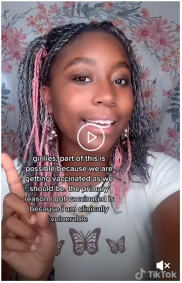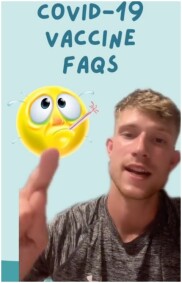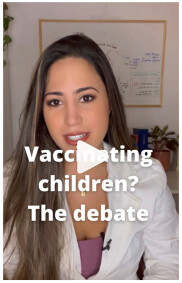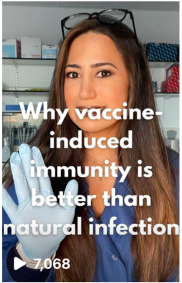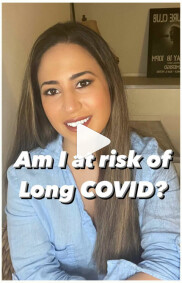
Feeling unsure about the vaccine?
Designed by young people for young people, here you can learn more about the vaccine, get answers to your questions and when ready, organise your jab locally.
HOW TO SPOT VACCINE MISINFORMATION
Do flies spread COVID-19? Can you catch the virus from your shoes? Will adding pepper to your soup protect you? When it comes to COVID-19, there are plenty of interesting theories out there.
We spoke to a vaccine expert to find out how to recognise vaccine misinformation. How to spot vaccine misinformation
Over 12? Book your vaccination today
If you are over 12, you can now book your second jab.
If you are over 16, you can now book your booster as well.
Book your vaccineIMPORTANT INFO IF YOU ARE 12 - 15
If you are 12-15, learn more about the Covid-19 vaccination.
Spilling the vaccine tea
We understand you’re sus. Watch people like you answer questions about the vaccine
Your questions answered, no cap
- wait 4 weeks (28 days) if you're aged 18 years old or over
- wait 12 weeks (84 days) if you're aged 12 to 17 years old
- wait 4 weeks (28 days) if you're aged 12 to 17 years old and at high-risk from COVID-19
This starts from the date you had symptoms, or the date of the positive test if you did not have any symptoms.
If you are 16 or older, you can have the booster vaccine 28 days after you had a positive test for Covid-19 or 28 days after your symptoms started.
The advice remains the same. Vaccines are our main form of defence against all variants of Covid-19, so it is still vitally important you get the vaccinated. However, the rules around self-isolation and testing have changed. Visit the Testing page for details.
Everyone over the age of 16 is eligible.
If you are 12 - 15 and have an underlying health condition, are a frontline care worker, or live with someone who has a weaker immune system (such as someone who has HIV, has had a transplant or is having certain treatments for cancer, lupus or rheumatoid arthritis), you are also eligible for the booster vaccine.
You can book your appointment easily through the National Booking Service and you can also change your appointment this way too. Everyone over the age of 12 will be offered two doses of the vaccine. If you are clinically vulnerable, you will need to have a second dose of vaccine 8 weeks after your first dose – your GP will have been in contact with you or your parents to discuss this with you already.
It can be tempting to think you aren’t at risk of COVID-19 at all - after all, if you are young and healthy, what’s the worst that could happen? Isn’t it basically like the flu? Well, no. Young and healthy people can be at a high risk of developing really nasty COVID-19 symptoms that can lead to hospitalisation, especially if you are unvaccinated.
Even if COVID-19 doesn’t badly impact you at the time, you could still suffer from Long-Covid! This can make you tired, breathless, cause brain fog, and more for months afterwards. Imagine feeling that unwell all the time - no thanks! It could even prevent you from working, going to class, hitting the gym, and doing all your other favourite activities for months or more.
To lower your risk, get the vaccine.
Even if you still aren’t worried about catching COVID-19, there are other risks - to your social life! For example, going on holiday, seeing your family at Christmas, going to events such as festivals, and venues like clubs (if you are over 18) could be harder to access without being vaccinated. On the other hand, if you have the jab, you might not have to self-isolate if you get pinged!
No. You can feel good about doing something great for those you love and the wider community by getting the vaccine. If you are unvaccinated, you are far more likely to catch COVID-19 and pass it on, particularly to people who are vulnerable because of an existing health condition. Even if you don’t show any symptoms – doesn’t mean you don’t have it or that you can’t pass it on. Want to keep visiting your grandparents safely? Being vaccinated will give you more peace of mind
This is a question that a lot of people have - and the answer is no, you won’t get COVID-19 from the vaccine itself. However, the vaccines do contain a small amount of the same genetic material as COVID-19, because like with all vaccines, that’s what needed to help your body develop more immunity. The other ingredients are water (yes, just water!), infused with preservatives and stabilisers. Vegan, vegetarian or halal? You’re good to go! The UK vaccines do not contain animal products, foetal products, mercury or egg. And the Pfizer vaccine is alcohol-free.
One of the main worries you might have is how fast the vaccines have been developed. We understand! Don’t vaccines take years and years to be safe? Vaccines are hard work to develop, but top scientists were already working on potential vaccines for other coronavirus strains. This means they already had the raw material to create the vaccine you will be offered!
Once the pandemic started, a large (really, really large!) amount of money was put forward from the entire world to support development speed. But rest assured that every vaccine has gone through the same rigorous testing and clinical trials which are required every time a new one is developed.
The vaccine is safe and effective! That’s the best news, right? More than 81 million vaccines have been given in England alone, reducing the spread of COVID-19. You can be safe in the knowledge that the NHS will never offer unsafe vaccinations and that the Medicines and Healthcare products Regulatory Agency (MHRA) has verified the safety of every vaccine.
Your friendly vaccinator will be a member of the NHS or those who the NHS has recruited to help out. Every single person is completely trained and supervised by registered healthcare professionals. Have a chat with the lovely person giving you your vaccine - they love what they do and come from a variety of fascinating backgrounds! They’ll also put you at your ease and answer any questions you might have at the time.
Understandably, you might worry about fertility issues, especially as we have all seen the rumours about this on social media recently - with some celebrities even unhelpfully jumping in. However, these claims are totally without merit. According to scientists – who, we hasten to add, definitely know more about the vaccine than celebs – there is no evidence that a link between the vaccine and fertility exists.
Some women have seen a change in their period cycle since having the vaccine. However, these are temporary changes that could occur to any woman at any time in her life. They should not be serious or permanent.
If this worries you, keep that in mind! It won’t impact your fertility, and if you are trying for a baby, the vaccine will not impact this, nor does it increase the risk of miscarriage. Even if you aren’t thinking about having kids now, it’s good to know for future reference. But having COVID-19 while you’re pregnant can end in still birth or seriously effect your baby’s birth weight. It is much, much safer for you and your baby to be vaccinated if you are pregnant.
Not everyone experiences side effects. You may feel mild symptoms such as having a sore arm, feeling tired, having a fever, getting a headache, or feeling a bit sick. You can deal with them like you would a mild cold, with paracetamol and rest - but call 111 if your side effects are more severe or you feel really worried. They will be happy to talk!
You can book yourself an appointment online. If you are 12-15 years old you will need to attend your appointment with a parent or carer.
If you are 16 or over there are also walk-in options available where you don’t need an appointment. Usually, the vaccine is given at pharmacies, shopping centres, libraries, or at your GP practice. You may even find yourself in a church! There is a lot of flexibility with slots available during the weekdays, evenings, and weekends. It can be a quick and easy part of your day - then you can grab a coffee and enjoy a well-deserved rest.
When you go to your vaccine centre, you will need to show that you are over 12 in some cases. If you decide to book through the National Booking Service, you will need to provide your name and date of birth and your NHS number. However, you will never need to provide proof of address or your immigration status. If you are using a Walk in Centre, you do not need to be registered with a GP practice or have an NHS number. The vaccination is completely free to anyone who wants it – you will never be charged any money for it.
If you are 12-15 years old and you pre-book your appointment at a vaccination centre, you will need to attend with a parent or carer.
Please wear a ‘T’-shirt to make it as easy as possible on the day to give you the jab.
While there is no hard evidence on drinking after the vaccine, you should try to avoid a big session, as it may suppress your immune system. Save it for when you’re fully vaccinated and can properly enjoy it!
The vaccine is not compulsory. But you will be doing a great thing to keep yourself, your family and your friends safe. Not only that, but you will be able to take part in all the things you love again.
This sounds a bit tricky, right? Have you already built up enough immunity naturally? Well, no. You may have developed some natural immunity, but there is no hard evidence on how long-lasting or effective it is. The immunity given by the vaccine is more reliable, and you know it’s there.
You may have heard about new mutations of COVID-19. While this sounds scary, it is quite a normal part of viruses. The good thing is that the vaccines we are currently using do work against these new strains - and scientists can change the vaccines as the virus changes.
You asked: Which booster vaccine should I get if I am allergic to penicillin?
Answer: You are OK to take any of the vaccines that you are offered
You asked: Have I got Long Covid, and where do I go to for information and help?
Answer: Take a look here Your COVID Recovery | Supporting your recovery after COVID-19
You asked: Can you get vaccinated if you have hade Swine Flu?
Answer: Yes
You asked: Do I need to get the flu vaccine as well as the COVID vaccine?
Answer: All secondary aged children (up to year 11) and young people who have long-term health conditions (up to 17 years) will be offered a free flu vaccination in school.
For people aged 18 to 50, they will be offered the flu vaccination (free of charge) by their GP if they are vulnerable (because they have a long term condition such as asthma, chronic respiratory etc).
If you’re not vulnerable they can get a flu jab from e.g. Boots, but there will be a charge.
You asked: Is it safe to have the flu vaccine with the COVID vaccine?
Answer: Yes
You asked: I only have one kidney.is it safe for me to get vaccinated?
Answer: Yes
You asked: I was with people who have developed flu-like symptoms but tested negative in a lateral flow test, as have I. Should we get a PCR test to make sure?
Answer: It’s a very good idea to, yes
You asked: I’ve had Covid, how soon after can I get vaccinated
Answer: You can get a vaccine 28 days after your Covid symptoms started, or 28 days after you tested positive for Covid
You asked: How do I cancel my appointment
Answer: You can do this online
Book or manage your coronavirus (COVID-19) vaccination - NHS (www.nhs.uk)
You asked: Do needles hurt
Answer: Most people say the needle doesn’t hurt at all because it is so thin
You asked: What are the risks if you have asthma?
Answer: There are no risks from the vaccine if you have asthma. You are more at risk of becoming very ill with Covid if you have asthma, so it’s a very good idea to have the vaccination.
You asked: My granddaughter missed vaccine at school because she was off with covid. She is 14 how soon can she get vaccinated
Answer: Your granddaughter is still able to get her first vaccine– visit https://www.nhs.uk/service-search/find-a-walk-in-coronavirus-covid-19-vaccination-site to find the nearest site to you – then you can either book and appointment or choose a walk-in site which does not require a booking.
You asked: I was CEV/shielding - I’ve had jabs 1 & 2 and the booster, but Chris Witty mentioned a 4th jab - what us this & who is it for? Thank you.
Answer: The fourth jab is for people with certain underlying health conditions. If you need it, you will be contacted by your GP.
You asked: What is the transmission % rate after vaccination and before?
Answer: People who have both vaccine doses and the booster are far less likely to contract covid and as a result, less likely to pass it on. There are no exact figures at the moment, because people can catch it and pass it on without knowing. That is why wearing masks and social distancing continue to be important.









